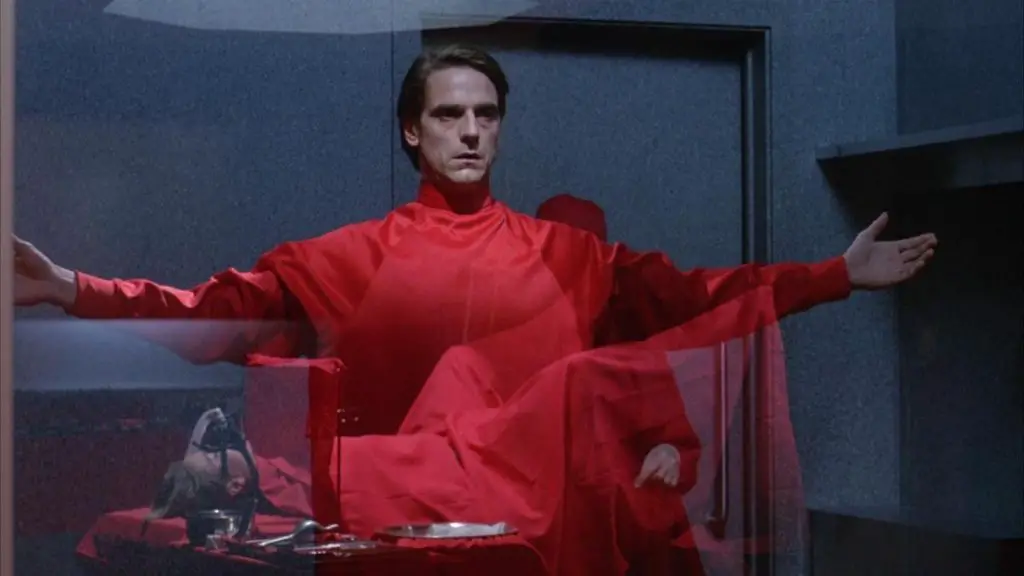
Inflated, swollen, sexy, and silent.
Am I describing the 2006 Seattle International Film Festival? Nah. Our nation’s largest movie marathon proudly matches the first three definitions. But this high-decibel event pushes millions of sounds through dozens of different theater audio systems, proclaiming itself a noisy riot of unraveling reels and reeling partiers.
I’m describing Jessica Biel’s lips.
Bulging gargantuan and balloon-like from her petite face, the prominent pair of pucker-pillows sealed Biel’s entry into the elite, facially endowed club currently inhabited by Angelina Jolie, Mick Jagger, and Steven Tyler. Otherwise, however, the “Seventh Heaven” starlet was an uninspired choice for glamming up SIFF’s opening night gala. On Thursday, May 25th, the heartthrob from such acclaimed masterworks as the re-made “Texas Chainsaw Massacre,” “Summer Catch,” and “Stealth” took center-stage at Seattle’s Paramount Theater.
Representing gala opener “The Illusionist” alongside director Neil Burger, and posing beneath golden chandeliers and bluish-purple spotlights, Biel smiled for the cameras and said… nothing. Where were her infinitely more cred-worthy co-stars Edward Norton and Paul Giamatti? Would Biel’s underwhelming non-speech act as a prophetic hint that beneath the slick, generously funded surface of the 32nd Annual Seattle International Film Festival, hype might prevail over substance?
Nonsense. Exploding across theaters, clubs, universities, and restaurants, SIFF is to film footage what Las Vegas is to slot machines – a writhing, pulsating community celebrating cinema. Forget Sundance. Seattle’s behemoth is the mother of all such screen-gazing amusement parks, with 2006’s installment boasting 275 feature length films. Over 600 volunteers step in to make it happen, alongside billionaire sponsors like Comcast and the Paul G. Allen Family Foundation. SIFF engulfs Seattle. During its 25 day spread, there’s absolutely no separation between The Event and The City. Inevitably, a downtown bystander will sip on the coffee of a SIFF sponsor, sack out at a hotel room next to the event’s press office, or read SIFF reviews in omnipresent weekly rags like The Stranger and Seattle Weekly.
With so many titles to choose from, filmgoers will inevitably discover precious gems. But they will also cut their feet on jagged, painful shards of time-wasting celluloid that line this lengthy cinematic beach. Even so, SIFF’s unusual, eclectic blend of screening stations makes the journey worthwhile. Looking for oddball cult fodder? Capitol Hill’s Egyptian Theatre will fill the bill with bizarre midnight gut-rippers like “Evil Aliens” and “Isolation.” Seeking out a more elegant theatrical experience? Behold Paul G. Allen’s lavish, 808-seat Cinerama, capable of playing vintage, 3-strip movies or more contemporary hits. Prefer a refined, art-house vibe? Check out Harvard Exit, resembling a cozy European church. For every connoisseur of moving pictures, there’s a perfect movie-house to haunt during SIFF’s 25-day stretch.
As Rod Stewart immortalized, “The First Cut is the Deepest.” In film festival terms, the blonde crooner’s words hold especially true. Will one’s initial viewing be the equivalent of caviar, or reek of rotting fish? The Seattle International Film Festival opening night gala screening failed to reach delicacy status, but also dodged the landfill heap.
“The Illusionist” is a perfectly serviceable film, concerning Vienna-dwelling, turn-of-the-century magician Eisenheim (Edward Norton). Born into a poor family, young Eisenheim must secretly court Duchess von Teschen (Biel) under the radar of snooty, elitist royalty. The romance is doomed, but years later, Eisenheim finds his lost love engaged to a temperamental, arrogant Crown Prince (Rufus Sewell) who, in the words of an acquaintance, “likes to give his lady friends a good thrashing now and then.” All the while, our smitten magic man entertains crowds with fast-growing orange trees that sprout from seeds onstage.
Sporting the droopy, tired eyes of a Thorazine-addled St. Bernard, Paul Giamatti provides the film’s one fully realized character. Playing Uhl, a police inspector sent by the jealous, suspicious Prince to arrest Eisenheim, Giamatti convincingly suggests a conflicted man whose loyalties are torn between power and justice. When the duchess is murdered, Eisenheim must earn Uhl’s sympathies, take down the Prince, and bring justice to his deceased lover. But things are not exactly as they seem.
“The Illusionist” looks great. The Prince’s marvelous abode, all mounted trophy animal heads and polished oak surfaces, defines snobby machismo. Meanwhile, Eisenheim’s magic shows give a vicarious sense of how much the art of illusion meant to masses not yet jaded by CGI imagery, video games, and amusement parks.
But there’s something mechanical and obvious about the film’s clunky script that minimizes its magic. In the tradition of “The Sixth Sense” and “The Usual Suspects,” “The Illusionist” pulls a twist ending out of its hat. While the revelation provides a satisfying wrap-up, it doesn’t transcend the predictable structure of its story. We walk away happy enough, but not entranced or hypnotized by Eisenheim’s sorcery.
“Early in the Morning” is one of those well-intentioned films that one wants to embrace. Nobility is scrawled all over its tragic tale of two Guinea boys desperate to escape their dead-end existences. Based on an actual incident, in which a pair of children’s bodies was uncovered from a plane’s landing gear, “Early in the Morning” wants to be an impassioned cry for increased support of Guinea’s African youth. But the film’s leaden pace and over-reliance on voiceover narrative result in a slow, redundant experience. We feel for these young idealists, but we don’t really get to know them.
Convinced that crossword puzzles are akin to yawning festivals, sheep-counting contests, and televised golf, in terms of rousing entertainment? Apparently, 50 million Americans beg to differ, director Patrick Creadon among them. Fascinating, immensely watchable, and surprisingly suspenseful, “Wordplay” is Creadon’s valentine to the New York Times’ Daily Crossword Page, the most revered and famous of such beloved puzzles.
Aware that watching a bunch of vocabulary-obsessed geeks filling out puzzles might be a bit sleepy on film, Creadon wisely focuses on the people behind this ink-lined passion. Celebrities explain how the morning ritual of crossword completion acts as a metaphor for their careers. Bill Clinton calls crossword puzzles “relaxing,” then adds this eloquent explanation for how they assist him in solving problems: “You have to find some aspect you understand, and build on it until you can unravel the mystery you’re trying to understand.” Well put. Imagine Dubya mouthing such insights. On second thought… don’t.
Documentary filmmaker Ken Burns likens his New York City hometown to a “set of grids and boxes,” much like a crossword puzzle. “I don’t drink coffee or smoke cigarettes, and I don’t need a drink at the end of the day,” Burns reveals. “But I need to do the New York Times crossword puzzle, in ink, every day.”
Creadon also sheds light on the crossword insiders who dedicate their waking hours to spreading the puzzler’s gospel. Acting as the nation’s crossword puzzle ambassador, Will Shortz is both the Times’ crossword editor and National Public Radio’s “Puzzle Master.” But Shortz is merely the spearhead of a huge web of puzzleheads. Merle Reagle, a lovable, quick-witted teddy bear of a man, makes his living as a professional crossword constructor.
Between gulps of breakfast at a Florida diner, Reagle provides some historical backbone to “Wordplay.” He informs us that the phenomenon began in 1913 with Margaret Farrar, the Times’ first crossword puzzle editor. On a more irreverent note, Reagle explains the Times’ policy against bodily function words. The paper’s puzzle page refuses to use a crass word if “it doesn’t pass the Sunday Morning Breakfast Test. No ‘urine.’ No ‘rectal.’”
“Wordplay” concludes at the Marriott Hotel in Stamford, CT – home of the 28th annual American Crossword Puzzle Tournament. As with his more familiar celebrity faces, Creadon focuses on the intense, therapeutic catharsis that crossword completion provides for everyman tournament players. Like “Spellbound,” and “Akela and the Bee,” Creadon’s affectionate lens finds beauty and heart in these fiercely competitive wordsmiths. It’s refreshing to see films offer a platform for champions who excel in contests that don’t require a pitcher’s arm, a running back’s speed, or a boxer’s left hook.
In fact, the film is stolen by 2001 ACP Tournament Winner Ellen Ripstein. “I’m just a little nerd girl,” she humbly admits. But the petite brunette’s crossword skills also earned her an underdog celebrity status. Ripstein’s face landed on the Wall Street Journal. Cheering her on at the 2001 competition, an admirer waves a banner labeled, “RRRRRIPSTEIN!” The film’s celebration of this cherished game’s ability to empower is summed up by Ripstein’s sweetly mischievous final words. “I once had a boyfriend who would always put me down. I’d say, ‘Well, what are you the best in the country at?’” Her accompanying smile alone is worth the price of admission.
TO BE CONTINUED…

